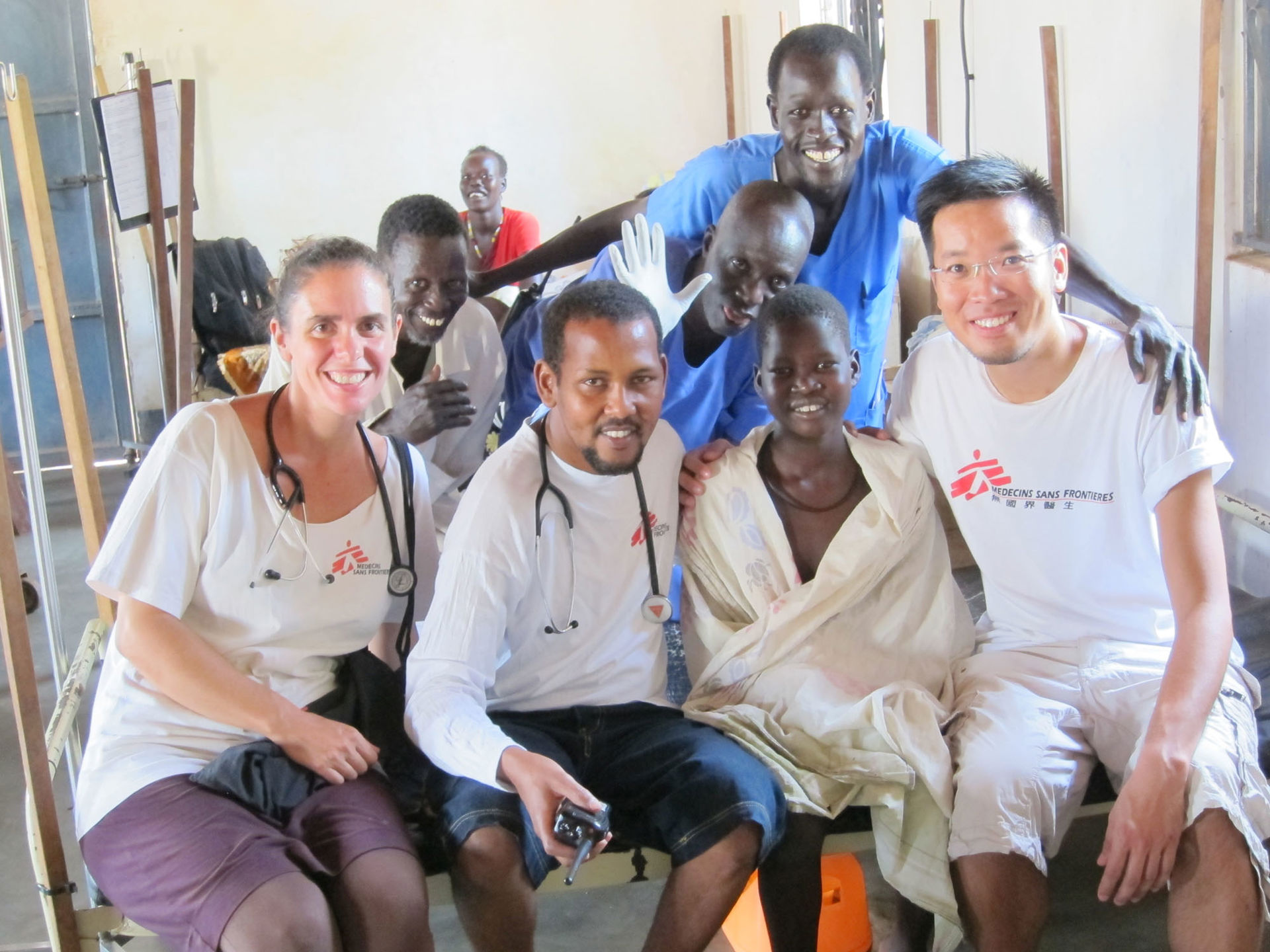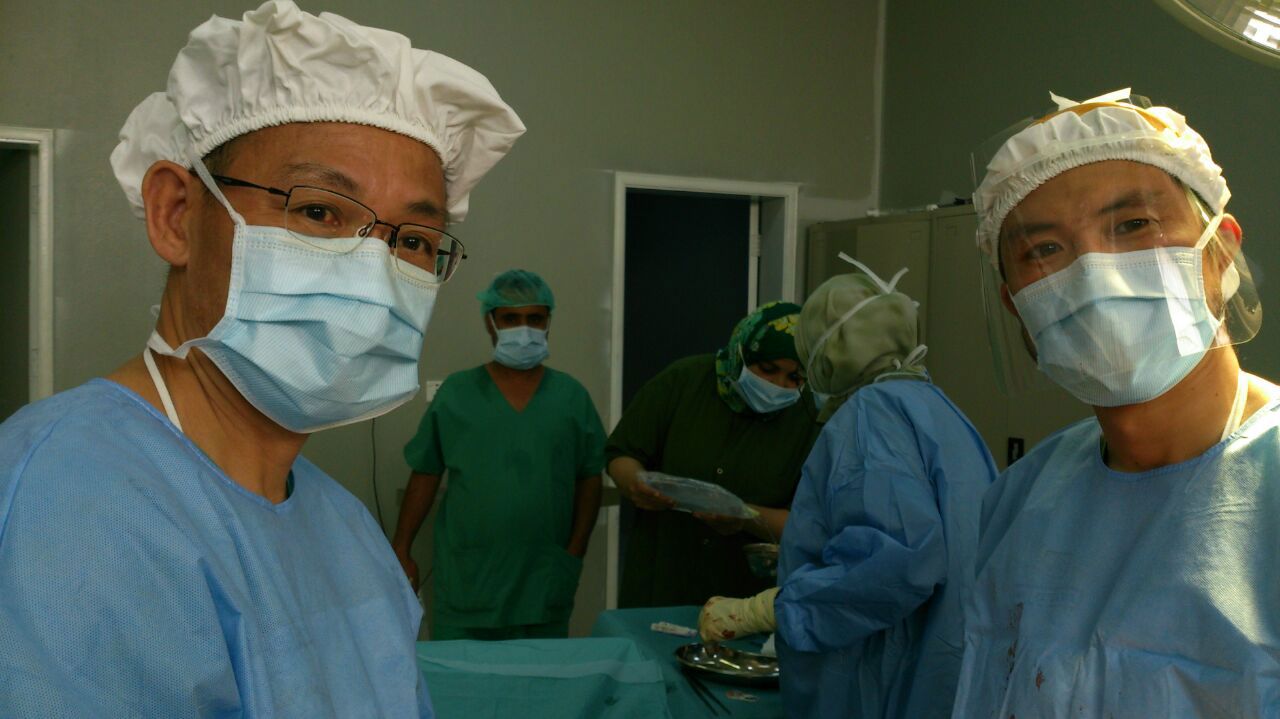Who is controlling the life?
Is it a series of coincidence or already planned by an almighty God?
One typical afternoon in the emergency room, while I was treating a naughty boy and removing the pebble he placed in his ear, a few people rushed in with one among them carrying a little girl. The nurses inquired about the details and learnt that the girl fell off from a tree when she tried to pick up some mangoes. Her relatives kept pointing to the girl’s right forearm and said there must be bone fracture. As people were examining her right forearm, I moved my gaze towards her body and I immediately realized it was not only bone fracture. She had a very low level of consciousness, and possibly she was in shock. I instantly put down my tools and ran from the boy to the girl.
Her name is Awek. Besides the bone fracture, there was no obvious wound on her body, yet it would not suffice to explain her shock status. Her pulse was so weak and her blood pressure was also hardly measurable. As I carried out a thorough examination, there were signs of anemia and her belly was slightly distended. It was very likely that she was suffering from an internal bleeding based on her condition. Generally, the bleeding would come from the chest, abdomen or pelvis. From my experience I suppose the problem probably came from her abdomen. Thus, we quickly arranged an emergency operation, instructed her relatives for blood donation and got ready for the blood transfusion. (Due to the lack of blood donation concept here, the blood storage in hospital was very minimal.)
The priority of the surgery was to locate and stop the bleeding. As I scalped her abdomen, it was found full of blood. Quickly after, I located the source of the internal bleeding, and it was the spleen. Spleen, located on the left upper abdomen, is normally covered and protected by the ribs, but it can be injured due to high energy trauma (e.g. traffic accident or falling from height). Since the spleen is highly vascular, once it is injured, the bleeding would be immediately fatal.
Unfortunately, her spleen had been completely damaged and shattered, and the main blood vessels were torn. Her internal bleeding in abdomen already amounted 2 liters, which was equivalent to about two-thirds of the blood according to her body size. The condition was extremely critical. I then proceeded to splenectomy after confirming no other internal organ injury.
During the operation, the power suddenly went out as the generator was down. Fortunately, I had experienced similar incidents before and I always wear a head torch just in case. The head torch was supposed to be used for hiking, so the brightness was not comparable to the operation light. Attaching it on my forehead was neither easy nor comfortable, but it definitely saves life during this kind of emergencies, which in fact is not too rare here!
After about twenty minutes, I removed her spleen and stopped the bleeding. Her blood pressures climbed back to the normal levels. As I thought to relax a bit, I received a very bad news: Awek’s blood type is O negative. O negative is often referred as the universal donor and it can be transfused to patients with any blood types. While they would help people in emergency situations, ironically, O negative patients could only receive the same blood type transfusion and yet it is a very rare blood type, as only one to five out of hundred people have such blood type.
We urgently requested Awek’s family to come for blood test, in order to maximize the matching opportunity. However, the news came one after another and were all disappointing. The blood types of her father and uncles were all not compatible. I immediately asked, “What about her mom?” The answer was frustrating, “Her mom stays at home because there is a newborn baby that needs breastfeeding.” My heart sank and I doubted how she would possibly give up her daughter’s life for the breastfeeding of another baby.
I quickly wrapped up the operation and went out to meet Awek ’s family. I was surprised to learn they had not realized how critical Awek’s condition was. After explaining to them, they immediately arranged her mom to come. Yet, their home was so far away from the hospital. Going back and forth would take six to seven hours even by cars.
Luckily, her condition had been stablised after the operation, yet her hemoglobin level was below 3. The normal hemoglobin level for her age group should be around 11 to 13. The level of 2-3 is hardly sufficient to maintain the oxygen needed for all organs. Hence, it was definitely life threatening. Blood transfusion was the next key to save her life.
Her mom finally arrived around midnight. Without any delay, we did the blood test and it was confirmed to be O negative, meaning it did match with Awek’s blood type. We were all glad about this, but shortly after, we learnt her mom was hepatitis B carrier. (In order to avoid the risk of infection caused by blood transfusion, it is a universal practice to check for a number of common and serious infectious diseases for each blood pack.)
Oh my God! Why making it so difficult for us?
If we were to do the blood transfusion, she would inevitably become a hepatitis B carrier. Provided that if her conditions were not stable, we would definitely go for the blood transfusion, as saving life prioritized the infection consequence. However, the vital signs showed that her current condition was stable. I debated whether I should prescribe the blood transfusion. I thought, if Awek already got hepatitis B infected from her mom, then I did not have to worry about the infection risk. But fortunately, the blood test showed she was not infected with hepatitis B.
I kept analyzing and also did some research. And the possible options were:
- To proceed with blood transfusion from her mom. It would resolve the danger of anemia, although it would cause hepatitis B infection.
- To arrange blood transfusion from O positive blood, though it would cause antibodies production, the chance of immediate adverse reaction was not too high. However, she must be able to receive special antibodies treatment when she got pregnant in the future, otherwise the foetus would be in danger.
- To hold on the blood transfusion, since the current condition was stable.
Honestly speaking, each option had its own pros and cons.
For women in South Sudan, parenthood is the most important thing in their life. They usually have eight to ten kids. I was very unwilling to let Awek bear such high pregnancy risk as she grows up.
I was also deterred to let her get infected with hepatitis B, which would lead to life threatening cirrhosis and liver cancer etc.
Thus, I made a risky decision, which was to continue having close monitoring over her condition. Unless her condition got worse, blood transfusion should not be considered.
The hours went by uneasily and she survived the night. At dawn, her condition was still stable, she slowly regained her consciousness and even asked me for water. At that time, I believed even in the absence of blood transfusion, she would be able to recover with her great vitality.
In the morning staff meeting, I encouraged everyone to step up and help if any of them belonged to O negative blood type. Yet among these forty people, none of us was O negative. Incredible news came when it approached noon, when I learnt that the blood type of one staff from the afternoon shift belonged to O negative and he already did the blood donation! I would not believe it initially, and I even doubted if luck really came. I went to meet the blood donor and he was called Jacob. At that particular moment, my heart had indescribable excitement while my eyes turned watery. I would not hold it but gave him a big hug and kept saying “Yin Ca Leec!”, which meant thank you in local language. I explained the background and subsequently he asked me to lead him to see Awek. Of course I was more than happy to do so. After introducing him to her family, everyone kept saying “Yin Ca Leec! Yin Ca Leec!”. It was indeed a very touching moment.
After the blood transfusion, Awek obviously gained energy. She would sit up and walk slowly inside the ward.
The only worrying sign was her fever. After full physical examination, it was confirmed there were no complications from the operation. Then I had her tested for malaria (since malarial infection is very common in our area). It was confirmed that she had also infected malaria, so I immediately prescribed anti-malarial treatment. Not long after, her fever was gone and she became revitalized. She could even able to take a walk outdoor.
About a week after, Awek was fully recovered. Our medical team witnessed her extremely great vitality, and every single one of us was deeply touched! It was once that everyone had prepared for the worst. And today, she was discharged from the hospital.
At the moment Awek was departing from our hospital, her parents kept saying Yin Ca Leec to me, and proposed that, if, after a few years, when Awek is getting married, and I am still here in South Sudan, they will invite me to her wedding, and would like to give me a cow as gift! (Cow is the most important asset of the local people here! Usually the parents will receive cows as dowry when their daughters are married.)
Indeed, being able to save her from death and witness her speedy recovery is already the best gift for me!
Sometimes you may think the luck is far away, and in fact, it is always accompanying you!



